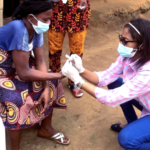BREAKING GROUND IN TRANSGENDER-LED HIV PROGRAMMING IN NIGERIA
AN EPIC SUCCESS STORY
Patrick Ikani, EpiC/FHI 360, Nigeria | Joseph Achanya, EpiC/Achieving Health Initiative Nigeria (AHNi) | Adekunle Idowu, Achieving Health Initiative Nigeria (AHNi) | Adaobi Olisa, EpiC/FHI 360, Nigeria | Maggie McCarten-Gibbs, EpiC/FHI 360 | Christopher Akolo, EpiC/FHI 360
While HIV prevalence among the general population in Nigeria is only 1.4 percent, global data show that transgender people are on average 13 times more likely to be HIV positive than the rest of the adult population. This discrepancy is largely due to the pervasive stigma and discrimination transgender people face. In Nigeria, transgender identity is not widely understood or accepted. As a result, transgender people face a high rate of violence in their communities, which mostly force them to hide their gender identities so as to retain employment, and they also fear seeking health care and other services.
In September 2019, with funding from the Key Populations Investment Fund (KPIF), the Meeting Targets and Maintaining Epidemic Control (EpiC) project launched a peer-led comprehensive HIV prevention, care and treatment program for transgender people in Bayelsa and Niger states, Nigeria. As the first transgender-specific HIV program in these states, the EpiC team faced the challenge of identifying and gaining the trust of the trans community. However, by partnering with local LGBTQ community-based organizations (CBOs), recruiting transgender peer navigators, establishing trans-friendly one-stop shops (OSSs), and advocating for the rights of transgender people with broader community structures, the program enabled unprecedented access to services in a safe and affirming environment.
Trans-Led Program Design
While there were no trans-led organizations in the area, the EpiC team was able to partner with two LGBTQ organizations—Initiative for Advancement of Humanity (IAH) and Community Health Initiative for Youth in Nigeria—and enlist a well-respected local transgender activist to endorse the program and help with outreach. Through these partnerships, the program identified 223 geographic areas frequented by trans community members in which to focus outreach activities.
The CBOs also recruited 38 transgender people living with HIV to serve as peer navigators. The peer navigators were trained in HIV case finding and testing strategies, screening for sexually transmitted infections (STIs), and linking individuals to antiretroviral therapy (ART) and oral pre-exposure prophylaxis (PrEP). They also learned how to use the two-step question method to identify individuals as transgender. Because gender identity is not easily observed in many cases, best practice recommends that individuals be identified through two data points: sex assigned at birth and gender identity.
After identifying and gaining the trust of many in the trans community, the program launched several services for this population. The project created a support group called Sisters of the Light Initiative, which held trainings on individuals’ rights and how to diffuse dangerous situations in which transgender people may encounter violence. Five OSSs (one stop shop) were opened to provide HIV and other health care services to transgender people and members of other key populations. These sites employed trans-friendly staff and provided a safe space for transgender people to socialize. The OSSs also hosted social activities, including beauty pageants, movie nights and networking events. To promote community empowerment, the OSSs hosted skill acquisition trainings: teaching participants hairdressing, knitting, and baking. These empowerment activities were intended to provide an avenue for safe and stable income generation. Mobile outreach teams, which included a trans-friendly health care provider who was frequently paired with a transgender peer navigator, worked alongside OSS staff to provide stigma-free HIV and STI testing and treatment, and ART and PrEP distribution.
A notable challenge in implementing this program was the threat of harassment poised by security personnel. In areas where being transgender is not well understood, transgender individuals are often targeted by law enforcement and other officials and sometimes face harassment, discrimination and violence. To create a safe space for participants, the program held sensitization sessions with community and law enforcement members to educate them on trans rights and to increase understanding of gender identity and how facing stigma and violence can increase a person’s risk for HIV. “Most [transgender people] were forced to impersonate other gender identities due to gender norms, cultural and religious beliefs. However, due to the [sensitization session] the [community] has become more enlightened on gender and sexual diversity and therefore realize that they are not possessed or mentally unstable,” said Nina, a transgender person in Bayelsa.
Programmatic Impacts
While there are no reliable national estimates of the transgender population in Nigeria, the EpiC project initially estimated a total population of 3,477 transgender people across both states using programmatic mapping. As of December 2021, the project was able to reach 5,010 transgender people with HIV testing and counseling services. Of those reached, 873 (17.4 percent) tested HIV positive. All 873 transgender people who tested positive were initiated on ART. As of September 2021, 99 percent of people initiated on ART were still on treatment, viral load testing coverage was 89 percent, and 97 percent of those tested were virally suppressed. Of the 4,137 transgender people who tested HIV negative through the program, 67 percent were screened for PrEP eligibility and all 1,080 who were eligible initiated PrEP. Those individuals on ART continue to receive the required support to ensure continuity of treatment while those who are HIV negative continue to access PrEP and other relevant prevention services based on their individual risks.

The program’s gains in HIV testing, treatment, and PrEP uptake among Nigerian transgender individuals can be attributed to various factors including being trans-led, expansion of access to trans-specific and trans-friendly services and implementation of structural interventions with law enforcement and others to address stigma and violence. By partnering with trusted transgender leaders and local organizations, the team was able to scale up this program quickly, and the OSSs became safe and fun places for the trans community to congregate and access care. KPIF’s commitment to expanding key populations’ access to HIV services made this successful trans-dedicated program possible.
Jasmine Jerry, a program officer with a CBO supported by the EpiC Nigeria team and a member of the transgender community, said, “[The program] actually brought us together… At first, we were in our closets, we were shy […] but then when [the project] had the first [transgender beauty] pageant […] some of us came out…. once we saw how we were embraced and how we were welcomed, we […] started coming out and inviting our friends. So, I just wanted to say a very big thank you.”
Featured Image: Jasmine Jerry was the first winner of the Miss IAH Pageant in December 2020 (Credit: EpiC Nigeria).



